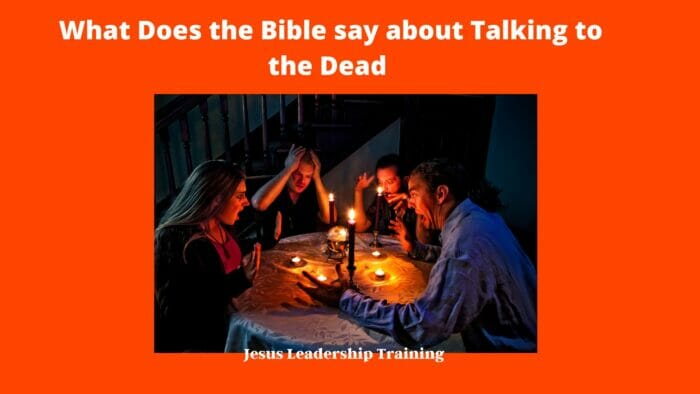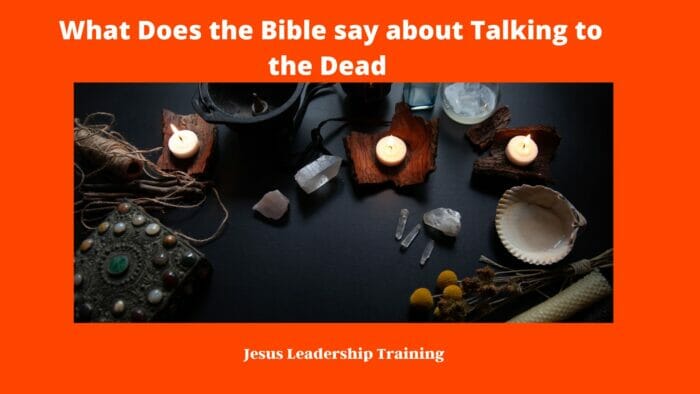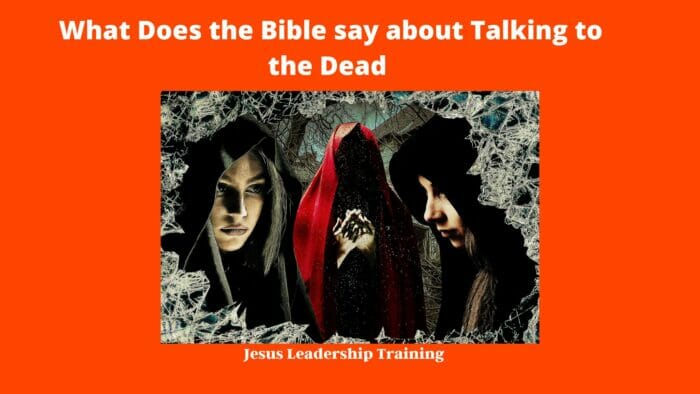What Does the Bible say about Talking to the Dead – The Bible is clear in its instructions regarding talking to the dead. In Deuteronomy 18:10-12, God says, “Let no one be found among you who sacrifices their son or daughter in the fire, who practices divination or sorcery, interprets omens, engages in witchcraft, or casts spells, or who is a medium or spiritist or who consults the dead.
Anyone who does these things is detestable to the Lord.” This unequivocally states that talking to the dead is forbidden by God. Furthermore, the Old Testament also condemns necromancy, the practice of communicating with the dead, in Isaiah 8:19-20, which states, “And when they say to you, ‘consult the mediums and the spiritists who whisper and mutter,’ should not a people consult their God? Should they consult the dead on behalf of the living?” Therefore, it is clear that the Bible does not condone communicating with the dead.
Table of Contents
What Does the Bible say about Talking to the Dead
Have you ever wondered what the Bible says about talking to the dead? It may surprise you to learn that there are verses in the Bible that indicate that it is not only possible, but it is also discouraged. In this blog, we will look at what the Bible says about talking to the dead and how we can draw spiritual lessons from it.

What Does the Bible Say About Talking to the Dead?
Many people believe it is possible to commune with the dead. This belief is often seen in popular culture, from the Ouija board to seances. But, what does the Bible say about this practice?

One of the things the Bible talks about is talking to the dead. This is a topic that is often misunderstood or even ignored by many Christians. In this blog, we will look at what the Bible says about talking to the dead, including witches, spells, necromancy, sorcery, mediums, demons, and possession.
What Does the Bible Say about familiar Spirits
- Leviticus 19:31 – This verse warns against consulting with familiar spirits or seeking out mediums. It states that people should not turn to these spiritual entities for guidance or advice, as this is considered an abomination to God.
- Deuteronomy 18:11 – This verse explicitly condemns the practice of consulting with familiar spirits. It states that those who do so are an abomination to the Lord, and they will be cut off from the people.
- Isaiah 8:19 – This verse describes familiar spirits as those who peep and mutter. It warns against seeking their wisdom, as it is not of God.
- 1 Chronicles 10:13-14 – This passage describes Saul’s death and the reason for it. It states that he died because he consulted with a familiar spirit and did not obey the Lord.
- Acts 16:16-18 – This passage describes an incident in which Paul encounters a possessed girl who had a spirit of divination. Paul casts out the spirit, thus showing that he did not approve of familiar spirits.
- Galatians 5:19-21 – This passage lists familiar spirits as one of the acts of the flesh. It states that those who practice these things will not inherit the kingdom of God.
- Revelation 21:8 – This verse states that those who practice sorcery, which includes consulting with familiar spirits, will have their place in the lake of fire.
Witches
The Bible makes it very clear that witchcraft is a practice that is to be avoided. In Deuteronomy 18:10-12, the Lord instructs His people to have nothing to do with those who practice witchcraft and other forms of sorcery. He even goes so far as to warn that those who practice these things will not enter the kingdom of heaven. This is further reinforced in Galatians 5:19-20, which lists “witchcraft” alongside other sinful behaviors.
Spells
The Bible also speaks out against the use of spells and charms to manipulate or control people. In Exodus 22:18, God warns against using spells to bring harm to anyone. This is also true of using spells to try to talk to the dead. In Leviticus 19:31, God tells His people that they are not to turn to mediums or necromancers.
Necromancy
In addition to spells and charms, the Bible also speaks out against necromancy. Necromancy is the practice of trying to communicate with the dead. This is a practice that God condemns in several places in the Bible. In Deuteronomy 18:11, God says that it is an “abomination” to practice necromancy. In Isaiah 8:19, He also warns that those who practice necromancy will be cursed.

Sorcery
The Bible also speaks out against sorcery. In Revelation 21:8, the Bible says that those who practice sorcery will have no place in the New Jerusalem. This is a clear sign that God does not approve of the practice of sorcery.
Mediums
Mediums are people who use their psychic abilities to communicate with the dead. The Bible speaks out against this practice as well. In Leviticus 19:31, God tells His people not to turn to mediums or necromancers. This is because He knows that it is not good for us to communicate with the dead.
Demons
The Bible also speaks out against the practice of summoning or invoking demons. In Deuteronomy 18:11, the Bible says that it is an “abomination” to practice divination, soothsaying, or sorcery. This includes any attempt to summon or invoke demons.

Possession
The Bible also warns against any practice that could lead to demonic possession. In Mark 9:43-45, Jesus tells His disciples not to let anyone who is not a believer in God to enter their home. He is warning them about the possibility of demonic possession.
The Bible is clear that talking to the dead is not something that we should be doing. The Lord warns us against the practices of witches, spells, necromancy, sorcery, mediums, and demonic possession. He knows that these things can bring harm to us. We should be sure to follow His instructions and avoid these practices.
The King James Version on Communicating with the Dead
The King James Version of the Bible contains several warnings when it comes to communicating with the dead. Deuteronomy 18:11 says: “Neither shall you bring a familiar spirit, nor one of your dead, to inquire of them to be defiled by them: I am the Lord your God.” This verse clearly states that it is wrong to bring a dead person back to ask questions.
Lazarus
The Bible is full of stories of people who were brought back from the dead. From the well-known Lazarus to others who are less famous, these stories are a testament to the power of God and His ability to bring people back from death. Here are some of the most notable examples of people who were brought back from the dead in the Bible.
One of the most well-known stories of resurrection in the Bible is that of Lazarus. According to the Gospel of John, Lazarus was a dear friend of Jesus who had died and had been buried for four days when Jesus came to his tomb. Jesus wept over his death and then commanded Lazarus to come out of the tomb, and he did.

Widow of Zarepath Only Son
Another example of someone who was brought back from the dead can be found in the book of 1 Kings. A widow from Zarephath had lost her only son and when Elijah prayed to God, he raised the child from the dead. This story is often used to demonstrate the power of faith in God and the power of prayer.
Eutychus
A third example can be found in the book of Acts. Here, a man named Eutychus had fallen asleep in a window and fell to his death. But when Paul prayed, the man was brought back to life. This story is a testament to the power of prayer and the ability for God to bring life out of death.
Jarius Daughter
Finally, the story of Jairus’ daughter is one of the most powerful examples of resurrection in the Bible. Jairus had come to Jesus asking for his daughter to be healed, but when Jesus arrived at Jairus’ house, he found her already dead. Jesus told the mourners to leave and then commanded the girl to wake up, and she did.
These examples demonstrate the power of God and His ability to bring life out of death. They also demonstrate the power of faith and prayer, as all four stories involve someone praying and asking for a miracle. Whether it’s Lazarus, the widow’s son, Eutychus, or Jairus’ daughter, these stories are a reminder that God is powerful and capable of performing miracles.
The Rich Man and the Dead: What Does the Bible Say?
In the book of Luke, there is a parable about a rich man who is in Hades and can see the living. He begs Abraham to send someone to his brothers to warn them not to make the same mistakes he did. However, Abraham says that even if someone was sent, they would not believe it. This story serves as a warning that talking to the dead is not something that is to be done lightly.
Reasons the Rich Man in hades was not allowed to return and warn His Brothers
- Refusal to Repent: The rich man in Hades was not allowed to return to the living world because he refused to repent for his sins. He had been warned of his impending doom yet he still indulged in the pleasures of life, focusing solely on his own wants and needs.
- Unwillingness to Change: The rich man in Hades was also not allowed to return because he was unwilling to change his ways. Even in the face of death, he remained obstinate, refusing to acknowledge the judgement of God or to take responsibility for his actions.
- Lack of Compassion: The rich man in Hades was not permitted to warn his brothers because he lacked the capacity for compassion. He was cold hearted and selfish, never taking the time to consider the plight of those around him.
- Disbelief in God: The rich man in Hades was not allowed to return to the living world because he failed to believe in the existence of God. He had no faith in the afterlife and disregarded all spiritual guidance and warnings.
- Contempt for the Poor: The rich man in Hades was denied entry to the living world because he harbored contempt for the poor. He was arrogant and dismissive, viewing the impoverished as beneath him and unworthy of his attention.
- Lack of Atonement: The rich man in Hades was not allowed to return and warn his brothers because he never made an attempt at atonement. He had great wealth and privilege yet he never used it to aid the less fortunate or to make amends for his wrongs.
Warnings on Familiar Spirits in the Bible
The Bible also contains several warnings against familiar spirits, which are spirits that are believed to inhabit the bodies of living people or animals. Leviticus 19:31 says, “Give no regard to mediums and familiar spirits; do not seek after them, to be defiled by them: I am the Lord your God.” This verse clearly states that it is wrong to seek out or to commune with familiar spirits.
- Communication with the Dead is Forbidden: The Bible is clear that communication with the dead is forbidden in both the Old and New Testament. Deuteronomy 18:11 states, “There shall not be found among you any one that maketh his son or his daughter to pass through the fire, or that useth divination, or an observer of times, or an enchanter, or a witch, or a charmer, or a consulter with familiar spirits, or a wizard, or a necromancer.” This passage explicitly states that seeking counsel from the dead is forbidden.
- It is Idolatry: In Isaiah 8:19-20, God warns us not to seek counsel from mediums and necromancers. He calls it “abomination” and “idolatry”. This implies that it is an act of worship towards something other than God.
- It is Unwise: In 1 Samuel 28, King Saul seeks out a witch to speak with the dead. God warns against this in 1 Corinthians 10:20-21 which states that “whatsoever is not of faith is sin.” Therefore, speaking with the dead is unwise and sinful.
- It is Unsafe: According to 1 Timothy 4:1, speaking with the dead is dangerous. The Bible says, “Now the Spirit speaketh expressly, that in the latter times some shall depart from the faith, giving heed to seducing spirits, and doctrines of devils.” In other words, speaking to the dead can lead to spiritual deception and demonic influence.
- It is Unnecessary: In John 16:13, Jesus tells us that when He goes away, He will send the Holy Spirit as our Counselor. It is unnecessary to seek out the dead when we have access to the Spirit of truth.
- It is Unbiblical: In Matthew 17:3, Jesus speaks to Moses and Elijah. This is the only instance in the Bible where a person speaks to the dead. All other examples of communication with the dead are negative. Therefore, it is clear that speaking to the dead is unbiblical.
Samuel and the Witch of Endor: What Does the Bible Say?
In the book of 1 Samuel, we find the story of Saul and the Witch of Endor. Saul was desperate for answers and went to the witch to try to contact the spirit of the prophet Samuel. God was not pleased with this and Saul was punished for his actions. This serves as a warning to us not to consult those who practice witchcraft or necromancy.
15 Unique Facts about Talking to the Dead
God’s Word on Talking to the Dead
God’s word is clear on communicating with the dead: it is something that should be avoided. Deuteronomy 18:12 says, “All who do these things are an abomination to the Lord.” This verse serves as a reminder that God is clear on his stance on communicating with the dead.
Biblical Verses on Communicating with the Dead
There are several other verses in the Bible that warn against talking to the dead. Isaiah 8:19 says, “When men tell you to consult mediums and spiritists, who whisper and mutter, should not a people inquire of their God?” This verse serves as a reminder that if we are in need of guidance, we should turn to God and not to those who practice necromancy.
Talking to the Dead According to the Bible
The Bible is clear that talking to the dead is wrong and should be avoided. It is something that should be left to God and not to those who practice necromancy. The Bible also contains several warnings about familiar spirits, which are spirits that inhabit the bodies of living people or animals.
What Can We Learn from the Bible about Talking to the Dead?
We can learn that talking to the dead is not something to be taken lightly. We should always turn to God when we are in need of guidance or answers. The Bible also serves as a reminder that familiar spirits should be avoided and that God is clear on his stance on communicating with the dead. We should also remember that even if we do commune with the dead, it will not guarantee us answers or guidance.
What does the Bible say about communicating with ancestors?
The Bible does not specifically address the issue of communicating with ancestors. However, the Bible does warn against talking to the dead, so it is safe to assume that communicating with ancestors is discouraged in the Bible.
What does God say about our loved ones who passed away?
God is clear on His stance on talking to the dead. He does not approve of it and warns us to avoid it. He does, however, promise us that our loved ones who have passed away are in His care and that He will eventually bring them back to life.
- Eternal Life: In Heaven, we will have eternal life with God and will be with Him forever. We will no longer suffer from death, disease, or any other form of suffering. (Revelation 21:4)
- No More Pain: In Heaven, all pain and sorrow will be gone. We will experience complete and perfect joy. (Revelation 21:4)
- Perfect Holiness: In Heaven, we will experience perfect holiness and righteousness. We will be completely free from sin and evil. (Revelation 21:27)
- Abundant Provision: In Heaven, we will experience abundance of all good things. We will never lack for anything. (Psalm 23:1-6)
- Beauty Beyond Imagination: In Heaven, we will experience beauty beyond what our eyes can imagine. (Revelation 21:18-21)
- Unfathomable Peace: In Heaven, we will experience perfect peace. We will never experience fear or worry. (Isaiah 11:9)
- Unconditional Love: In Heaven, we will be loved by God unconditionally and without end. (John 3:16)
- Endless Worship: In Heaven, we will be able to worship God endlessly, with no end or interruption. (Revelation 5:13)
- Perfect Unity: In Heaven, we will experience perfect unity with all of God’s people. We will be united in perfect love, peace, and harmony. (Revelation 7:9-17)
- Perfect Knowledge: In Heaven, we will have perfect knowledge of God and all His ways. We will know Him intimately and completely. (1 Corinthians 13:12)
What the Bible says about Touching the Dead?
The Bible does not specifically address the issue of touching the dead. However, it does warn against engaging in necromancy and communing with the dead, so it is safe to assume that touching the dead is not something that is encouraged in the Bible.
What is the Nazarite Vow
The Nazarite Vow is a special vow made by individuals in the Old Testament of the Bible to dedicate themselves to the service of God. It is a vow of consecration to the Lord and is based on Numbers 6:1-21. The Nazarite Vow is an act of devotion to God, much like a vow of poverty or chastity.
The purpose of the Nazarite Vow was to make a special vow to God that the person would be set apart from the rest of the people and dedicate their life to God’s service. This act of separation was seen as a sign of loyalty and commitment to the Lord. It is important to note that the person taking the vow was not required to keep it for their entire life, but could end it whenever they wished.
The specifics of the vow are outlined in Numbers 6:1-21. In this passage, the Lord instructs Moses to instruct the people on the rules of the Nazarite Vow. The vow consists of three main points, which are:
- Refrain from drinking wine or anything else made from grapes (including grape juice).
- Refrain from cutting one’s hair or shaving one’s beard.
- Refrain from contact with a dead body, even that of a close relative.
These three restrictions are meant to indicate a separation from the world and a dedication to the Lord. The duration of the vow could vary, and it could be kept for a week, a month, or even a lifetime.
At the end of the vow, the person taking it was to bring a special offering to the Lord, which was to be a male lamb with no blemish and a grain offering. The person taking the vow was also to shave their head at the end of the vow and offer a sacrifice of thanksgiving to the Lord.
The Nazarite Vow was a voluntary act of dedication and devotion to the Lord. It was a way for the people to demonstrate their loyalty and faithfulness to God. It is a reminder that God desires our full dedication, and that we should strive to live a life of devotion and service to Him.
Do you reunite with your spouse in heaven?
The Bible does not specifically address the issue of reuniting with a spouse in heaven. However, the Bible does say that there is a reunion with our loved ones in heaven. Therefore, it is possible that we will reunite with our spouse in heaven, but we do not know for sure.
Throughout history, there have been many questions about what happens after we die. One of the most fascinating questions to consider is what will become of our relationships with others in the afterlife. In the Bible, the Jews ask Jesus a controversial question about a woman who had been married to several men in her lifetime. The Jews asked Jesus whose wife she would be in heaven – she had many husbands.
Religious Perspective
The Bible provides insight into this difficult question. In the Gospel of Matthew, Jesus is asked by the Sadducees, who deny the resurrection of the dead, “Whose wife will she be in the resurrection?” Jesus responds, “For in the resurrection they neither marry nor are given in marriage, but are like angels in heaven.” Jesus’ answer is clear – in the afterlife, we will not be bound by the same marital laws that are in effect in this life.
Historical Perspective
The Jews’ question to Jesus about the woman with many husbands has intrigued people for centuries. In the first century AD, the idea of a woman having multiple husbands was a source of scandal. In those days, a woman was expected to remain faithful to her husband, and a woman who married multiple times was seen as immoral. This historical context helps explain why the Jews would have asked Jesus such a question.
Encouraging Voice
We may never know the answer to the question of what happens to our relationships in the afterlife. But Jesus’ response to the Jews’ question provides us with a message of hope. He reminds us that in the afterlife, we will be freed from the limits of this life, including the restrictions of marriage. This means that our relationships with others can be filled with love and connection, regardless of any earthly ties.
By exploring the religious, historical, and encouraging perspectives on the Jews’ question to Jesus about the woman with many husbands, we can gain insight into our relationships with others in the afterlife. We can find hope in Jesus’ words that in the afterlife, we will be freed from the complications of this life and will be able to enjoy relationships with others without any earthly constraints.
Final Thoughts – What Does the Bible say about Talking to the Dead
In this blog, we looked at what the Bible says about talking to the dead. We found that the Bible warns against this practice and is clear on God’s stance on it. We also looked at what the Bible says about communicating with ancestors, what God says about our loved ones who have passed away, what the Bible says about touching the dead and whether or not we will reunite with our spouse in heaven. Ultimately, the Bible is clear that talking to the dead is wrong and should be avoided.



